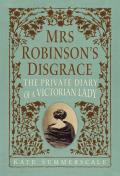by Kate Summerscale
 Until the introduction of the Matrimonial Causes Act in 1857, divorce was a privilege granted only to England's elite requiring as it did a private act of Parliament. In 1958 the newly created Court of Divorce and Matrimonial Causes began to grant divorces to couples where adultery (in the case of the wife) or multiple "matrimonial offences" (in the case of the husband) could be verified.
Until the introduction of the Matrimonial Causes Act in 1857, divorce was a privilege granted only to England's elite requiring as it did a private act of Parliament. In 1958 the newly created Court of Divorce and Matrimonial Causes began to grant divorces to couples where adultery (in the case of the wife) or multiple "matrimonial offences" (in the case of the husband) could be verified.
In Mrs. Robinson's Disgrace Summerscale turns her lens to one of the most titillating of the court's early divorce proceedings, the suit of Henry Oliver Robinson against his wife Isabella (and one Dr. Edward Lane) on the grounds of adultery, which began on Monday, June 14, 1858. The chief piece of evidence in the case was Isabella's diary, long passages of which were read during the trial and excerpted in the press to the scandalized public's great delight.
Though the press no doubt loved the fodder provided by the spate of divorce proceedings, it was not necessarily in favor of the new court and the relative ease with which couples were receiving divorces. The Saturday Review insisted that,
in the interests of the greatest happiness of the many, [...] a judicial separation should be granted only in the "gravest emergency": "a married couple should endure a very considerable amount of discomfort, incompatibility, personal suffering, and distress, and yet should continue to live together as man and wife." (217)Women were expected the bear the brunt of that personal suffering. A custody battle decided in 1858 by the Court of Chancery yielded this insightful comment from Vice-Chancellor Kindersley:
I believe it is the common case that very few wives do consider sufficiently their solemn obligation of obedience and submission to their husbands' wishes, even though they be capricious. However harsh, however cruel the husband may be, it does not justify the wife's want of that due submission to the husband, which is her duty both by the law of God and by the law of man. (196)These quotes1 really do show how much times have changed.
Fascinated as I am by Victorian social mores, I was intrigued by the premise of Mrs. Robinson's Disgrace and was thoroughly engrossed while reading it. I heartily recommend it to people interested in the Victorian period, gender studies, legal history, social change, and even archives. While I think that some lovers of historic fiction may enjoy Mrs. Robinson's Disgrace, I'm sure others will dislike it simply because it doesn't read like a novel.
Isabella Robinson was trapped in a loveless marriage to a man whose work often took him away from the home for long periods of time. Profoundly unhappy, she channeled all her energy into remaining composed in front of company, expressing her true feelings and desires only to her diary.
Mrs. Robinson's Disgrace is not a simple presentation of Isabella's story as told in her diary (1850-1855). Summerscale uses the diary, the Robinson divorce suit, and the public reaction to each to give a fuller picture of Isabella's life and the world in which she lived. Of course, that's not to say that there is a dearth of juicy, adulturous thought and action, whether real or imagined.
- And this one, which I couldn't bear to leave out, considering the fact that this blog is facilitating the "culpable neglect" of my "most important [wifely] duties":
She who is faithfully employed in discharging the various duties of a wife and daughter, a mother and friend," according to Thomas Broadhurst's popular manual Advice to Young Ladies on the Improvement of the Mind and Conduct of Life (1810), "is far more usefully occupied than one who, to the culpable neglect of the most important obligations, is daily absorbed by philosophic and literary speculations, or soaring aloft amidst the enchanted regions of fiction and romance. (82-83)
disclosure: I received a review copy of Mrs. Robinson's Disgrace from Bloomsbury via NetGalley.

Have you read her previous book? The Suspicions of Mr. Whicher? She takes a similar approach of examining the time & world through the lens of a sensationalized event (in this case a murder and investigation), particularly the attitudes of the British toward privacy and the home.
ReplyDeleteI have not yet read _Mr. Whicher_, but I am definitely interested in doing so.
ReplyDelete